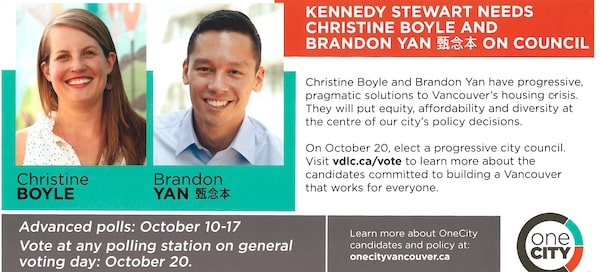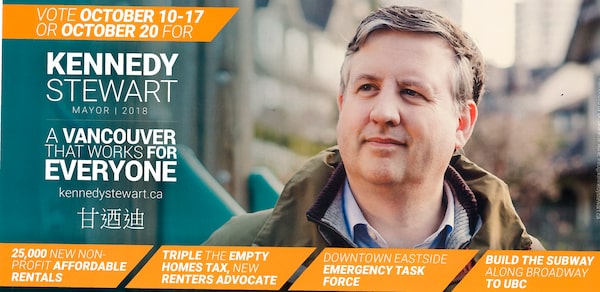
An election flyer mailed out to homes in Vancouver features city council candidates from the OneCity party. The flyers say they were authorized by OneCity.
Some independent candidates in the Vancouver region are pooling resources to purchase joint advertising ahead of this week’s election, the latest example of how campaigns are finding ways to extend their reach in the face of new limits on donations and spending.
It’s particularly difficult for local-government candidates in B.C. elections to campaign because there is no ward system. That forces voters to try to make choices among sometimes dozens of candidates. As a result, some candidates will work together informally to try to help voters identify a group of like-minded future councillors.
Kennedy Stewart, an independent mayoral candidate, recently sent out flyers with the OneCity party. The flyer features Mr. Stewart’s photo and campaign messaging on one side, while the other side presents two OneCity candidates as the best way to support Mr. Stewart, a former NDP MP, as mayor. The flyer declares OneCity paid for it, although the party said Mr. Stewart also paid for half.
In New Westminster, there are joint newspapers advertisements appearing for the six independent candidates running for council who incumbent mayor Jonathan Coté identified as part of his team.
The candidates insist the joint advertising is legal as long as they disclose everything to Elections BC, the provincial elections agency. But the practice is nonetheless raising the ire of opposition groups.
“All of these so-called independents, it’s a joke,” said Daniel Fontaine, a council candidate with the New Westminster Progressive Electors Coalition. “Talking about making this a mockery. When I look at this, I can’t help but think of how [the local-election campaign finance law] will need a complete rewrite.”

Independent mayoral candidate Kennedy Stewart is featured on an election flyer.
Mike Witherly, a campaign strategist with Vancouver’s Non-Partisan Association, said the joint ads "increasingly looks like a concerted effort to work around the purpose of the finance rules.”
But those doing the joint advertising say it’s a practice that’s been allowed forever and is still allowed under the new campaign-finance law for municipalities that was supposed to remove the influence of money from corporations and unions. Elections BC even details on its website how candidates should split expenses if they are doing ads together.
“It’s a standard practice and we have consulted with Elections BC,” said Neil Monckton, campaign manager for Mr. Stewart.
Some candidates have complained the law unfairly penalizes formal parties and benefits groups who call themselves independents but are clearly affiliated.
Recent changes to the law impose a $1,200 donation limit to candidates and parties. That means a single donor, for example, can only give a combined total of $1,200 to Vancouver’s Non-Partisan Association and any of its 20 candidates.
In contrast, donors can give $1,200 to each of Mr. Coté’s allies in New Westminster, who have branded themselves Team Coté but have not registered as a formal party. Likewise, a donor in Vancouver can give $1,200 to Mr. Stewart’s campaign and another $1,200 to the OneCity party, even though they are pooling resources.
Mr. Coté has said New Westminster has no large donors, so the idea that hundreds of people will be maxing out their contributions to his “team” – or the unaffiliated slate in any smaller town – is unlikely.
 Frances Bula
Frances Bula